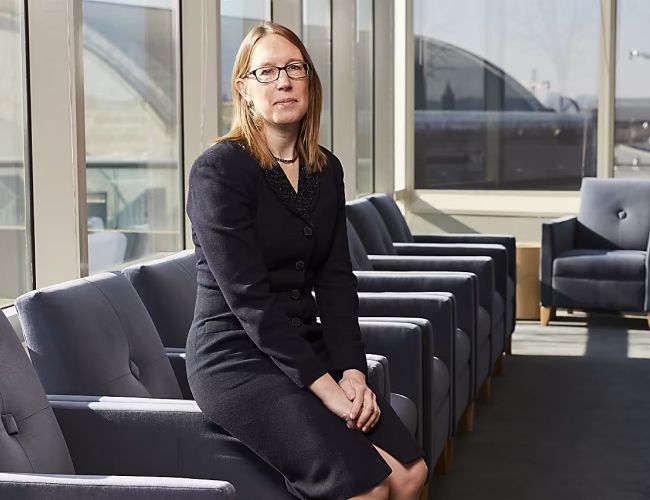-
Hester Peirce calls for ending restrictive crypto regulations, enabling firms to access critical services like custody solutions.
-
Jurisdictional clarity is a priority to help crypto businesses navigate SEC oversight and reduce compliance challenges.
-
Collaborative rulemaking seeks transparent, inclusive policies by involving regulators, crypto stakeholders, and consumer advocates.
Hester Peirce, a Commissioner at the U.S. Securities and Exchange Commission (SEC), has proposed significant reforms aimed at clarifying and improving the regulatory environment for cryptocurrencies. Speaking during an interview on Fox Business, Peirce outlined three critical steps to address existing challenges in the crypto sector. Her recommendations come amidst growing concerns over restrictive practices, often referred to as “Operation Chokepoint 2.0.”
Ending Restrictive Regulations to Foster Growth in the Crypto Industry
Hester Peirce has called for an end to regulatory practices that she believes hinder the progress of the cryptocurrency industry. Speaking in a recent interview on Fox News, Peirce emphasized the need to eliminate restrictive approaches that prevent crypto firms from accessing essential services, such as custody solutions. According to Peirce, these services are critical for the industry to move forward and thrive.
https://x.com/CryptosR_Us/status/1866681813910917561
She specifically addressed what has been termed Operation Chokepoint 2.0, a perceived regulatory strategy aimed at restricting crypto businesses from integrating into mainstream financial systems.
Peirce stressed that regulatory frameworks should not act as barriers but as enablers for legitimate crypto activities. The Commissioner highlighted that preventing firms from accessing vital services creates a stifling environment, undermining the potential of blockchain technology and cryptocurrencies.
This issue gained attention recently after Coinbase revealed FDIC pause letters obtained through a Freedom of Information Act (FOIA) request. The exchange’s legal team claimed the documents showed informal measures taken by federal agencies to limit financial institutions’ engagement with crypto firms. While these actions stopped short of outright bans, they raised concerns about the sector’s ability to operate within the traditional financial system.
Defining Jurisdictional Clarity to Reduce Regulatory Uncertainty
The second aspect of Peirce’s plan, according to Eleanor Terret, the Fox News journalist, involves establishing clear boundaries regarding the SEC’s jurisdiction over digital assets. She emphasized identifying which cryptocurrencies and tokens are classified as securities.
https://x.com/EleanorTerrett/status/1866227468149121318
This clarity would help reduce confusion among market participants and streamline compliance with regulatory requirements. According to Peirce, this uncertainty has caused delays and legal disputes, hampering the ability of companies to operate efficiently.
The Commissioner advocated establishing well-defined boundaries to help stakeholders understand their regulatory obligations. She explained that market participants need to know which assets are beyond the SEC’s oversight. This would allow businesses to operate without unnecessary compliance burdens, reducing the risk of penalties or enforcement actions for unintentional violations.
Peirce’s remarks highlight the importance of reducing the gray areas in current regulations. She pointed out that many crypto projects face challenges in interpreting outdated laws that were designed before the advent of blockchain technology. Clearer guidelines would enable developers and investors to navigate the legal landscape with confidence, fostering innovation while maintaining accountability.
Collaborative Rulemaking for Transparent and Inclusive Policies
Peirce’s final recommendation calls for collaboration between regulators and crypto entities to adapt existing rules. She advocates for open discussions involving a wide range of stakeholders, ensuring transparency and inclusivity in the rulemaking process. By engaging directly with the industry, the SEC could better understand the unique challenges faced by crypto firms and craft tailored solutions.
This approach aligns with ongoing investigations into “Operation Chokepoint 2.0.” U.S. Representative French Hill has pledged to examine these practices, asserting that financial institutions should not close accounts without valid reasons. Similarly, Cardano founder Charles Hoskinson has warned of the global implications of such measures, describing them as efforts to restrict crypto businesses worldwide.
Will Clear Rules and Collaboration Drive Crypto Stability?
By halting these restrictive measures, Peirce argues, the crypto industry could achieve greater legitimacy and stability. She maintained that the government’s role should focus on fostering innovation while protecting investors rather than obstructing the industry’s access to necessary infrastructure. This approach, she asserted, would allow the sector to grow responsibly while aligning with broader economic goals.
Under the proposed changes, the SEC would collaborate with other regulatory agencies to ensure a cohesive framework. This approach aims to eliminate overlaps and contradictions in existing regulations. By doing so, the industry could experience a more predictable regulatory environment, encouraging sustainable growth.
Peirce emphasized the importance of a collaborative approach to crypto regulation involving both public and private stakeholders. She proposed that the SEC engage directly with crypto entities to adapt existing rules to the industry’s unique needs. According to Peirce, such collaboration would allow regulators to address practical challenges while ensuring compliance with legal standards.
The Commissioner called for open, public discussions to facilitate this process, ensuring transparency and inclusivity. She stated that involving a diverse range of participants, including industry leaders, policymakers, and consumer advocates, would lead to balanced regulations that reflect the realities of the crypto market. This participatory approach could expedite the process of crafting effective policies.
Peirce has stressed that engaging with crypto businesses would provide valuable insights into how existing laws can be tailored to support innovation. Additionally, she noted that public participation would build trust and accountability, helping to align the interests of regulators and the industry.
She expressed confidence that collaborative rulemaking could lead to a more legible regulatory framework in a relatively short time. Such efforts would not only enhance the SEC’s understanding of the crypto ecosystem but also create a foundation for long-term cooperation.
Read the full article here

